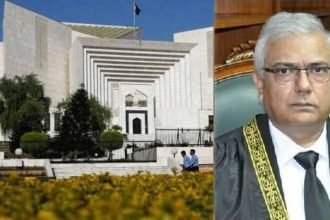Apparently annoyed at being in shackles for almost three years, Kaavan is not even allowing his handler, Bilal, to approach him.
Bilal has been looking after the elephant for around 25 years and started chaining Kaavan after his mate, Saheli died in 2012.
Kaavan was unchained after Prime Minister Nawaz Sharif directed the zoo to end the cruel practice of chaining the elephant.
The zoo management is of the view that Kaavan’s temporary enclosure is vulnerable to any “wild act” by the pachyderm. Earlier, on Wednesday, Kaavan managed to breach the enclosure gate by reaching across the moat with his trunk.
“We have already started widening the moat, which is relatively narrow at the rear of the enclosure, so the elephant cannot cross it in future,” CDA Environment Director General Suleman Sheikh said.
Sheikh said the CDA was planning to build a proper enclosure at an estimated cost of Rs30 million under the Islamabad zoo expansion plan, and that Kaavan is currently living in a temporary set up.
Scott Blaiss, an elephant expert and the CEO of the Global Sanctuary for Elephants, said in a Facebook message that, “The facility is not secure enough for an elephant. It is grossly insufficient and unsafe.”
Blaiss, who has spent the last 27 years dealing with elephants, commented that the fence near the pond, combined with the proximity of the public, is disconcerting.
“If provoked, it will only take Kaavan a second to rip the chain link fence down,” Blaiss said.
“From what I can tell, the rest of the enclosure is of a similar fashion — concrete about 1.5 meters tall, and then fencing, which will only serve as a moderate deterrent. There is not a clear solution except to secure his release,” he said, adding that coupled with the fact that Kaavan was not used to being free to roam, and needs to be trained and cared for by professional elephants experts, means that the only safe option for both animal and human welfare is to send Kaavan to a sanctuary.
A number of local and international animal charity organisations have been offering the CDA financial help, ranging from bearing the cost of transporting Kaavan to an elephant sanctuary to constructing a modern, new enclosure at the zoo.
The government of Myanmar has also shown its willingness to house the elephant at a rehabilitation centre in Myanmar, and Four Paws, a British animal welfare charity, is ready to finance transportation and other related costs.
“I had the chance to meet with the union minster of livestock, fisheries and rural development in Myanmar and he agreed to support the effort and permit the import of the elephant to a rehabilitation center in Myanmar,” a representative of Four Paws, Dr Amir Khalil, said in his email.
To initiate the process, Four Paws has sought details such as ownership of the elephant and a formal request to the organisation from the owner to shift the elephant.
Similarly, a local animal right organisation has also contacted CDA with an offer to pay the Rs30 million required to build a new enclosure for the elephant.
A representative of the organisation is due to meet the zoo management next week.







